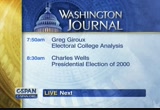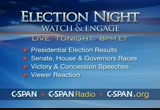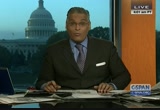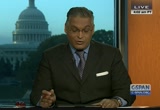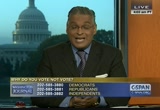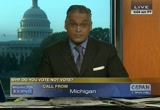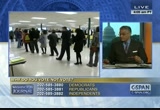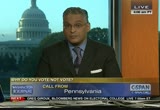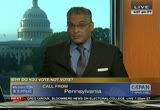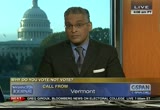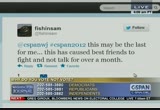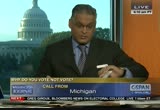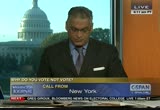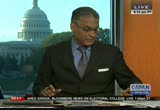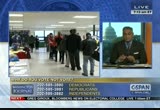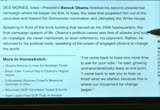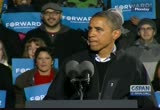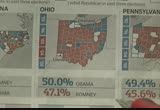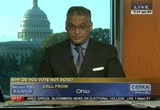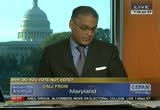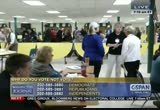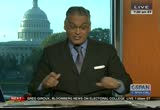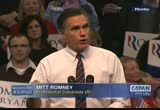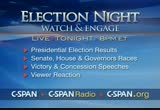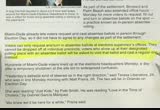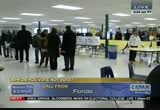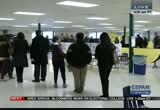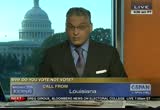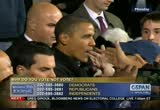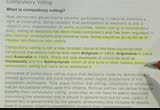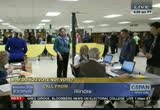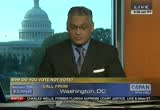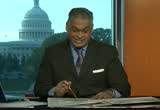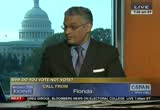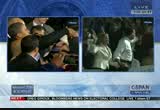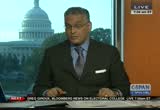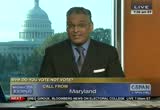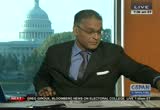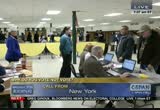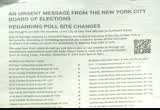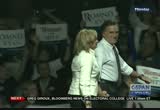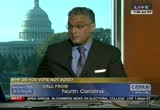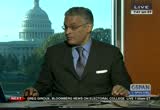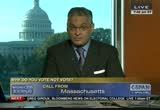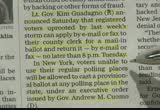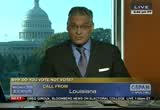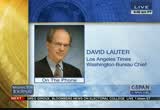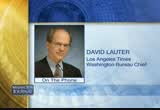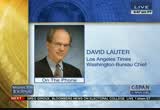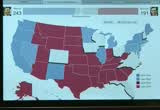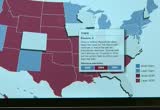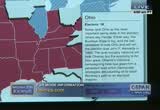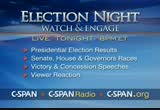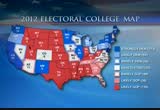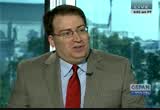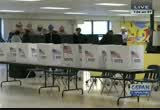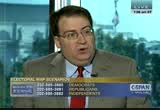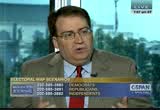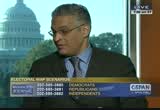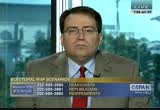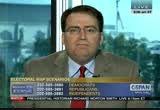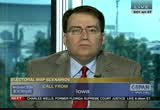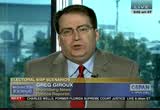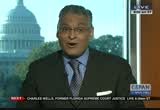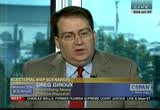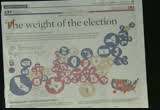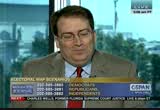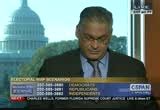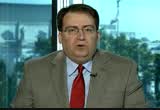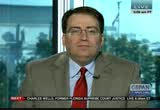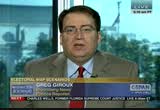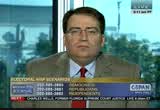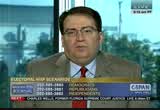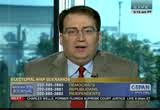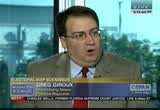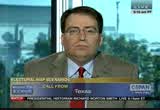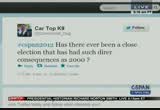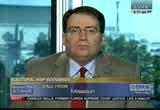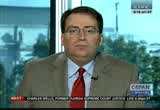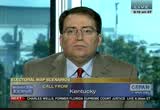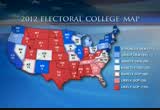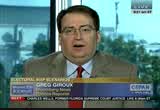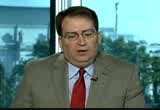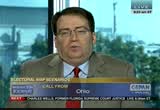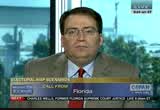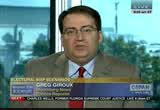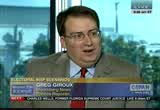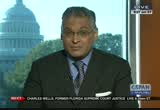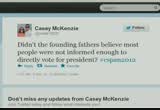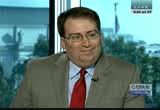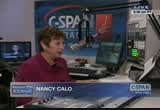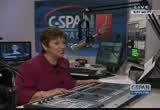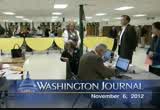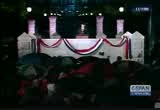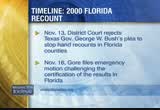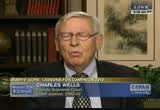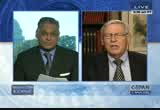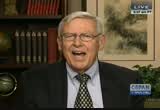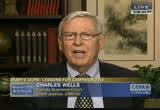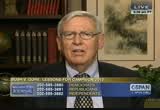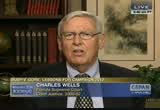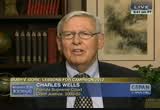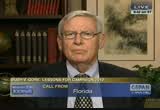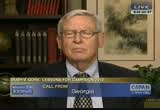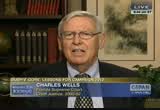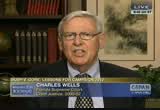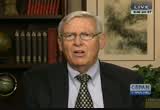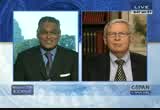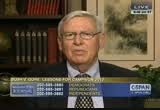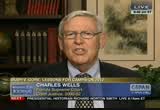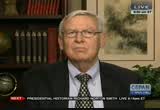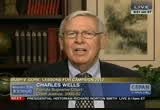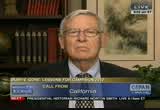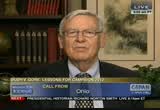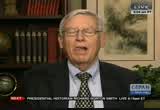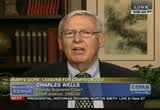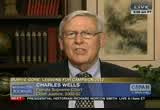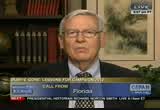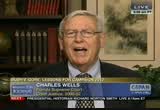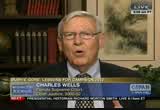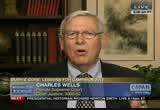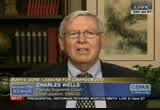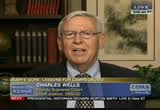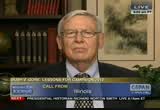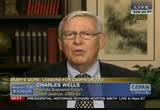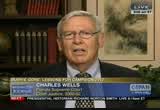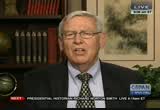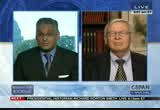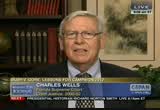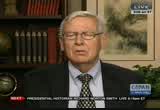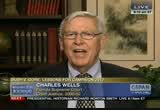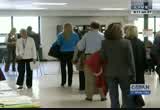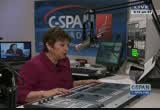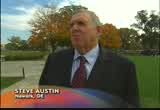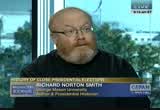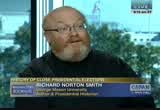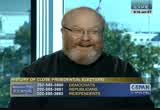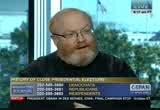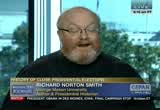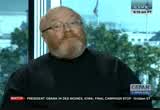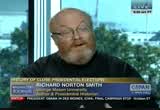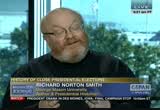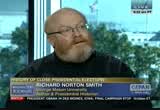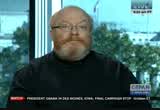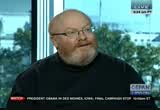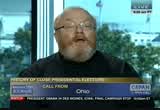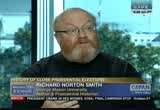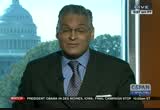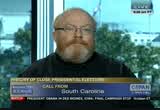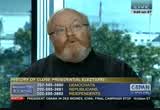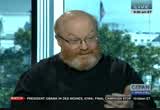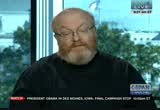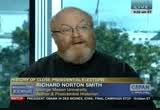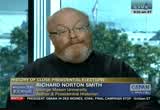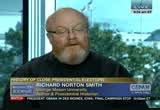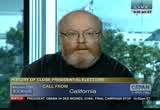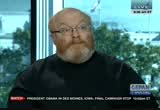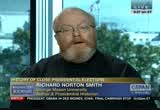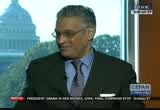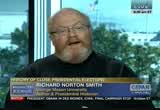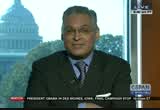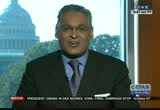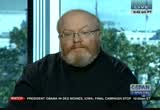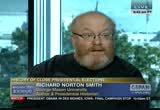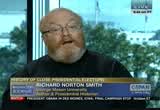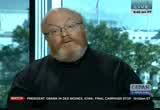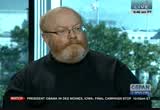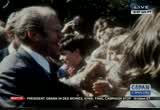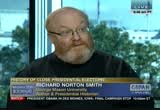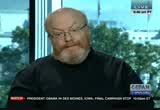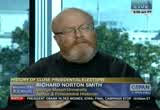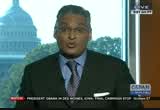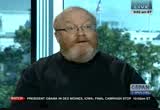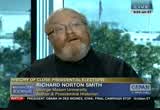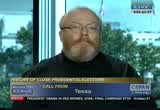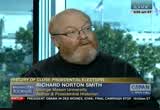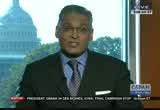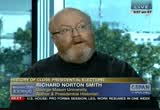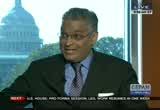tv Washington Journal CSPAN November 6, 2012 7:00am-10:00am EST
7:00 am
charles wells to look back at the 2000 election result in florida and we'll discuss the history of close presidential elections with presidential historian richard norton smith p. -- smith. [captioning performed by national captioning institute] [captions copyright national cable satellite corp. 2012] [captioned by the national captioning institute --www.ncicap.org--] >> from this location of fairfax high school in fairfax, pretty busy so far. closed at 7:00. florida closing at 8:00 tonight. ohio also closing later after that. the first tally of votes coming in from dixville knocks, new hampshire. -- knox, new hampshire. by the way, c-span's coverage of election day 2012 starts at 8:00 this evening with the interactive result on the house and governor's races.
7:01 am
you can see a real-time display of the balance of powers. live video from both the obama and romney headquarters. plus, you can get reaction as well. again, join us tonight. we invite you to join us at 8:00 starting on c-span. listen to it on c-span radio. also tune into c-span.org for more information and other information concerning election night 2012. for our first 45 minutes, we want to have you weigh in on why you decided to vote or perhaps why you decided not to vote. and here is how you can best reach us at the bottom of your screen -- you can also put something on our facebook page or tweet us and also you can send us an e-mail. again, for our next 45 minutes why you decided to vote or why
7:02 am
you decided not to vote. the headlines from the battle ground state newspaper, the "miami herald," final countdown. polls open at 7:00 a.m. to 7:00 p.m. that's the "miami herald." the end of the road, clinton stops here. -- clumps here, romney finishes tonight. the columbus dispatch out of ohio, it's decision time. poll hours, 6:30 a.m., 7:30 p.m. the subhead, the last push. a big choice on the government's role is how they decided to headline the subhead. candidates may be close in the polls but their visions are wide apart. just to give you a sam planing of how the newspapers are playing out. as far as our question of why you decided to vote or maybe not decide to vote, there is a website who writes about the idea of those within florida,
7:03 am
she's intrusived about those who are not going to vote tonight. she writes in part this. it's true that everybody should vote. but what you'll never hear from the parties is that democracy is better off without voter who is don't do any homework. the rhetoric you hear is about the absolutely no obligation to vote but there are valid reasons to sit it out and among the, if your ballot will an exercise of random selection. you don't feel comfortable with the choices, you might be in the same boat as craig engle. he's a 50-year-old veteran and author at a promotions coordinator for a televisions station. -- just a little bit to give you some idea in this first 45 minutes. tell us why you decided to vote or maybe you decided not vote. you can go ahead and pick the
7:04 am
line that best represents you. this time around for our twitter, the #is c-span2012. if you want to send us a tweet that way. first call is from harbor springs, michigan, it's on the democrats line. kathy joins us. have you decided to note or not to vote? >> i have decided to vote and my son received some extra credit if he goes with me to the polls. it's my constitutional right. i'm grateful for that. i have here in front of me something that i picked up at the public school and it's a nice printout of all the proposals for the state of michigan. it has on the left hand side who
7:05 am
the democratic is endorsing in terms of the president united states senator. i think it's our one true avenue to help bring about change. i can't wait to go to the polls. i think president obama's doing a very good job. i was extremely impressed with what little i saw with him speaking yesterday. he got tearful. i admire his wife. when i watched her speech last week and i was very, very happy when she said keep showing up. so i'm going to show up at the polls. host: aside from your son getting extra credit for school, what does he think about the voting in general? caller: there's good discussion, i think, inside the school. i did think about that the other day. i don't preach to him. he does -- he had a paper route.
7:06 am
so he reads the newspaper, which i think is important. i think he understands where we are at as a family. and i think he has a pretty good idea, you know, what the country needs and as it pertains to perhaps his circumstances. he's a very -- i think most kids are pretty intuitive and they understand. host: for our first 45 minutes, why you decided to vote or not vote. the pennsylvania is highlighted in the "wall street journal," particularly looking at its breakdown when it comes to latest polling for president obama who weighs in at 49.4% of the vote. and mitt romney, 45.6% of the vote. that's according to tabulations by the "wall street journal." jim joins us from winwood, pennsylvania, republican line. hello, jim. guest: hello. i am going to vote. i definitely want to influence the election even though it's only one vote and i have a history lesson for you listeners
7:07 am
for the democrats versus the republicans? you look at the history of where the democrats have ruled for a long time and compared to that which the republicans have done, you'll see a big difference and a reason to vote for the republicans. and that is this the democrats have ruled the cities of america. the majority of them for a long time. one to two generations. 25 to 50 years in most cultures. and what has happened there, they have destroyed the cities. take a look around. where you live, knew where you live. if you live in the cities, the lady that just called probably from the suburbs. what has happened over the last two generations is the people who could have -- could three the city have fleed the cities. they ran away from to the republican-controlled suburbs. if you look at the cities, the
7:08 am
cities are -- the schools in the city have been decimated. host: evan from shellburn, vermont, independent line. hello. caller: hi, pedro. i'm not voting today and the reason i'm voting is basically between a harvard millionaire who's white and a harvard millionaire who's black. and the choices between that are 300 million other people that could possibly participate in the lecktrorl college have an impact. there's really no option. but ultimately, the patriot act. what's happened to it? 9/11, where did it go? the jobs. i'm working for a job at $9 an hour that i worked six years ago for $9.50.
7:09 am
it's wage stagnation. this is a myth, a knit that -- myth that we're going to create 1,200 jobs. a company doesn't hire people because their taxes get lower. a company hires people when they need people. host: when did you come to the seclusion that -- conclusion that you've never vote? caller: i've never vote. the sad fact is your vote doesn't count they spend millions and billons of dollars trying to get you that counts but ultimately, who knows what laws exists? who knows what laws are being passed today or what laws will be passed tomorrow? host: fairfax, virginia, is what you're seeing from here in washington, d.c. one of several polling places not only virginia but across the united states as people decided to vote or not vote this morning and the numbers will be on your screen. sam is off of twitter.
7:10 am
saying this may be the last for me. this has caused best friends to fight and not talk for over a month. jean? caller: hi, i'm voting democratic and the reasons is because of the policy of the republicans versus the policies of the democrats. the republicans care about money and not about people. and the democrats care about people and follow the teachings of jesus. there was a lady who called in last night who was very confused, who's after the rallies and she was confused because of abortion. well, when i was in school, i wrote a paper before roe v. wade was passed. women have been getting abortions way before roe v. wade but the thing is, they were criminalized. they had to do self-induced abortions using coat hangers, knives, scissors, drinking
7:11 am
potions or going to back alley doctors. so what roe v. wade did was allow them to go to a hospital to be treated. and what i feel very, very strongly about as a woman, no one as the right to legislate what i do with my body. i would have to stand before god and give an account of what i do, not some other man, not some other woman, but me, myself. host: twitter, this is maverick who says i'm voting because it's important we fix the skort. the next president -- supreme court. the next president will be making an appointment for lifetime decision. peter joins us from our republican line. caller: yes, hi. thanks for taking my call. host: voting or not voting? caller: i'm voting to make a change. nobody really sees what's going on in new york this last past week how there's fuel lines and
7:12 am
to me, i guess the media -- how people are reporting, they're not reporting, and how government, our mayor, our governor are patting themselves on the back and they don't deserve it because they're not doing a good job. we don't have fuel for over a week. i'm voting for a change. and i urge all of the listeners out there to vote. all of these politicians out that have been controlling our government for the last 30 years, they bankrupted us. we're in debt. they mismanaged everything. just picture one example and them controlling our supermarkets in this country. we would starve to death the way they're running our fuel lines here. we haven't got fuel in. there's four, five-hour lines just to get fuel. i mean, it's really bad here. host: hey, up next, from district heights in maryland. democrats line. hello. caller: good morning. host: morning. caller: yeah, pedro, i'm
7:13 am
independent. i'm a black independent, ironically because you usually get this lockstep pattern of, you know, democrats, black people and democratic party. i'm independent because i looked at what weaver did in connecticut and what the senator who just -- in pennsylvania, a leck specter. and i think an independent thinker is what this election needs. i mean, hands down, i believe that the polls are just propagandas to keep people involved. i believe that mitt romney never had a chance. i think that he's going to completely lose. i think that the democratic party are going to have a complete flush from the supreme court on down.
7:14 am
host: why did you vote? >> well, other people were killed for constitutional rights and i think it's important to exercise that right because so many people don't like the caller who just called and, you know, you could reference people like that to say not getting involved is another answer to a solution. you've got the tea party and all kind of other -- ralph nader and those kinds of people. so i think it's just really important to, you know, exercise your right. host: the "wall street journal" highlights president obama in iowa, finishing up his tour, he's heading back to illinois today on the schedule playing some basketball which is a tradition of his on election day. here's another e-mail --
7:15 am
>> to all of you who lived and breathed the hard work of change, i want to thank you. you took this campaign and you made it your own and you organized yourself block by block, neighborhood by neighborhood, county by county, starting a movement that spread across the country, a movement that made up of young and old and rich and poor and young and -- back and white, gay, straight, democrats, latino, who all believe they've got something to contribute. and we all deserve a shot at our own american dream. and when the cynics said we couldn't, you said yes, we can. [applause]
7:16 am
you said yes, we can and we did. against all odds, we did. we didn't know what challenges would come when we began this journey. we didn't know how deep the crisis would turn out. but we knew we would get through those challenges the same way this nation always has. with that determined unconquerable american spirit that said no matter how bad the storm gets no, matter how tough times are, we're all in this together. we rise or fall as one nation and as one people. that's the spirit that carried us through the trials and tribulations in the last four years. host: that's president obama from ohio. oh, i'm sorry, from iowa. ohio is currently according to "wall street journal" polling about 50% for the president,
7:17 am
47.1% for governor romney. there's a map going back to looking at core republican counties in red, core republican councell in blue. our next caller comes from ohio. caller: i feel like i must vote. it's not necessarily for me. i'm 66 years old, right. but women are at severe risk if the -- on-again, off-again republican candidate wins. the democrats must win so that women will have their right to determine the future of their own bodies. and without it, we're jumping back to the mid 1950's.
7:18 am
and i'm at an area in ohio that keeps its blinders on. and oh, that's not what i really want. well, guess what, you will feel the impact if the democratic party, barack, who finally got our laws passed as they should be so that we can make our own decisions in motion. host: 270 electoral votes determines the presidency. ohio, where our caller called in from. 18 electoral votes for that state. other swing states, virginia 13 electoral votes. north carolina, 15. florida, with 29. this map comes courtesy of the "financial times." steve from baltimore, maryland, republican line. steve, hello go ahead. caller: hello. how are you this morning? host: i'm well. caller: i'm from baltimore, maryland, 22 years old, african-american republican.
7:19 am
this year, you know, it's like i'm going to be portering the president. i'm voting mainly to support what positive social values we have left. in our state, there's a lot of different ballot questions that are important. they're voting on pretty much their version of the dream act and i'm pretty much looking at what i want for my children and what value i want to be taught for my kids and that's why i'm voting today. as far as the presidential election goes, like i said, i bleed red. i'm a republican born and die. i really live to support my party. unfortunately, this time, i looked at romney from every aspect possible in my view and it just didn't seem like he's been forthcoming. and i looked at that second debate of what he does to create jobs and romney just continued to talk about that five-point plan. i've never had a point see what those points would be. and then emergency room the
7:20 am
president's rebuttal and he broke down each of those five points and how he would help jeremy get a job now. i'm not a huge supporter of the president but i do see that the president is very genuine. i really see, you know, that's genuine and i just don't get that from romney. i don't get that he's forthcoming. i can't -- you know, on the low end, i'll say that he's just a little short-term memory loss and i can't support anyone that's attached from reality whether he's a democrat or republican. host: the says he's watching the romney rally from new hampshire. he watched the courtesy of our c-span 2012 site. through the link, we invite you through the site as well. our election coverage 8:00 tonight. a lot of information that you will learn in real time as the night goes on. again, campaign 2012, the website, "abc news" talks about
7:21 am
for governor romney's rally in new hampshire that took place in manchester. saying that mitt romney held his final rally before midnight, calling a thrun rows crowd here. he talked about the state put him on the path of nomination and thanking his supporters. >> this is a special moment for ann and for me because this is where our campaign began. you've got this campaign started a year and a half ago. [applause] and then your primary vote put me on the path to win the republican nomination. [applause] and tomorrow, your votes and
7:22 am
your work right here in new hampshire will help me become the next president of the united states. [cheers and applause] now look, i want to thank you for the work that so many of you have done, making calls from our victory centers and putting a sign in your yard and now, putting a sign in your neighbor's yard. [laughter] convincing a friend or a coworker or two to vote for paul ryan and me. and of course -- [applause] what makes this rally and all your work so inspiring is that you're here, not because of one person or because of a party, you're here because of america. host: you can watch that election night coverage at 8:00 on our network, c-span. you can listen it to on c-span radio. join along on c-span.org as
7:23 am
well. you will get the president election results from the house and governance -- governors races and victory and concession speeches. we start at 8:00. please join us then. the miami herald on their paper this morning takes a look at absentee ballot saying that more than 4.5 million people have voted early which accounts for 38% of the 12 million voters and half the ones likely to cast the ballot. there's another herald story. this also looks at the absentee ballots the headline saying that south florida voters will be able to cast absentee ballots in person that could take place today at election headquarters. patricia mazzie writes that voters can only request and turn in absentee ballot at election supervisor offices. they cannot be dropped off at individual precincts. voters showing off with a ballot
7:24 am
will be asked to void it and enter one instead. ashley from our on it line. caller: good morning. how are you? >> i'm well, thank you. caller: i can honestly say that i haven't -- i'm only 24 and i haven't honestly paid a lot of attention of how things work and last year, i did vote for obama. i think a lot of young people were under the misunderstanding that i think a lot of us were misinformed to be honest with you. i think it was purely based on the plays the race card a lot and i actually did want to inform everybody. i watched a very informative news i read recently. it cuz called balm, love him or hate him in 2016. and that information really opened my eyes. if i haven't watched that movie, i probably would have voted for obama. and i can say that i really don't -- i don't favor either one of them personally, but i
7:25 am
believe that it is very important for everybody to vote and i truly believe that if we continue down the road with obama, that it's only going to make things worse for us in the long run. everything from what he's done with our oil, you know, he's gone out and basically put all of our money into other countries. i believe we're head for troubled times and i believe romney has already proven he's done a lot with our country with what he's already done with his previous positions that he's held and i truly believe it's important that we get out there and not let obama prey on the ignorance of young people and are minorities and put our vote in there for romney. host: our c-span camera outside of washington, d.c. use look at voters in virginia with polls opening at 6:00. louisiana, democrats line, diane, hello. caller: hi. good morning. how are you? host: i'm well, thank you. caller: i voted early.
7:26 am
i voted democratic. well, my children turned 18 years old, they got a birthday card and a voter voter. -- card. as far as obama being bad for the country, i think he's been good for the nation. i work in an oil company primarily with white republicans. one of my coworker told me i just want to tell you i'm a democrat. i think obama's doing a great job. i think there's a lot of intimidation on the part of people. when you look at the president as a black man. as a child, i was raised when you're black, tough to work twice as hard, three times harder to get into a position and make better money. and i think that people need to change their attitudes about what our politicians are doing in these united states. i think people are being misled into a position that they don't
7:27 am
understand things. i defend the bureaucracy every day. i listen to terrible things at work. and i think it's terribly unfair for people to judge people without actually researching things. the first thing that i got when i started working at this company was the e-mail about obama praying with the muslims. i had to defend his christianity. i mean, it's just really -- the ignorance of people is unremarkable. host: mt. vernon, new york. richard? caller: yes. i decided to vote because we, as a people, black people, that's me, we support this man wholeheartedly and when he came into office, our unemployment for us was 12%. now it's 14%. young people is 15%. i don't understand what has he done?
7:28 am
he can't devote awe his time to us. i understand that, ok? no problem. he's got a nation to take care of. but if he could give us about 15 minutes, we shouldn't be, you know, he hasn't really elevated us. at all. i don't understand and his christianity is causing -- that's killing a baby that survives abortion. i don't understand. y'all have a blessed day. take care. host: voting in the united states is voluntary. to give you a per stiff to other countries that is mandatory. in some countries, voting is considered a duty. it is made compulsory and has been regulated in national constitutions and electoral laws. some impose sanctions on non-voters. there are also example offense countries --
7:29 am
let's give you a sense of what goes on in other countries. in this country, we're talking about why you decided to vote or not vote. diction, illinois, this is chris on the independent line. good morning. caller: good morning. i'm voting today because i am upset with obstruction from the republicans the past four years. i ask myself how much better would life be today if they hadn't behaved like this? their policy scare me. and when they put out report months ago that there would be 12 million new jobs created in
7:30 am
the next four years, romney jumped on it immediately and said he created it, when it would be the president' policies that would have made them. so in terms, i'm voting for the president today. thank you. host: washington, d.c. willy, good morning, democrats line. caller: hello? >> hello. you're on. caller: my reason for voting is i was an independent truck driver and when bill clinton was in office, i bought my house. diesel fuel was -- per gallon and when bush took office, diesel fuel went for 1,200 to $13, how for the same gallon. they're living in inflation. with any republican president, people will say you created jobs but they also create inflation
7:31 am
whereas loaf of bread is $4. a gallon of milk is $3.50. should you pay your mortgage or groceries for your children? it's just -- i believe that democrats are people, for the people. barack was given four years to help clean up this mess that george bush created. gets four more years, i think he can turn this country around. if you take time to look at the progress he's making, no one, he's cleaning up george bush mess as well as bringing this economy back around. i think people ought to reward him for being courageous enough to do such a thing. host: what to watch for as results trickle in which gives a blow-by-blow, particularly willing at battleground states. when it said that the subhead says late night ahead.
7:32 am
the most important votes won't show up in either candidate's column. they are the provisional ballot. those must certify later and their numbers expected to go because rulings on the ballot changes. next up is from florida, republican line. hello. caller: hello. i am a registered republican but i will say that this year, i will not be voting republican and president is really hard. i'm a young 25-year-old. i'm a teacher. i went to college.
7:33 am
and i'm truly with him on a lot of issues and here, we have two really extreme can dites choose from. but i have to say it's what the president has done personally for college students and hearing what romney's going to do is a little scary. for the future, i try to inspire my students every day and choose their rights. a lot of the kids don't have a lot of things at home. and so to be able to inspire them for the country where they can really chose that position of where they are today, to where they could be tomorrow, i feel like the president really has grasped that concept. whereas i feel some of romney's policy in regards to that. here he is talking about the teacher's union, i will say on record that i do not usually
7:34 am
vote towards the candidate that they choose the opinion is telling us about. in 2008, i voted for mccain. suffer, -- however, it's just his principles that -- like if we took away -- i lose my voice. 30 minutes for lunch, i get to say -- and talk with other teachers. and without the teachers union, that could be taken away. i still have to do with lunch duty monitor and that sort of thing. and so those are some of my reasons for voting in this election, however, it is very difficult to make a decision and i honestly didn't start really listening to a lot of the politics discussed on the relaxed two weeks as the election in the final debate. because i really wanted to hear and mccain has really been that on-again, off-again candidate
7:35 am
where one time he says one thing and then another time, sometimes, it's not sentenced. he's saying something else. host: and that was davenport, florida. from twitter, i'm not voting because my husband and i are military and either way we work for the same boss, a.k.a., the president. maryland, tom, independent line. caller: good morning. host: you're on sir, go ahead. caller: the reason why i am not voting this year is because in the campaign advises on television, there's way too much mud slinging and there's been too many broken prices -- promises from the government. and one of these years, i would like to see an election campaign where everybody can vote, none of the above as an option. and just see what happens. host: what do you think would happen because of that?
7:36 am
caller: well, it might just be a toss-up all over the place because you don't need to vote for. because of all this mud slinging. host: the word recount of the subject of the story in the "wall street journal" today. a battlegrounds weighed recount rules. saying the ohio state. both parties elect to determine the election. absentee ballots in ohio have to be postmarked by monday. bronx, new york, democrats line, joe. good morning. caller: good morning, pedro. i'm joe.
7:37 am
i usually, when i call, i say i'm joe the counselor, i'm not joe, plumber. the reason why i am voting today is for the reason that i am about to give you. i look at this two men running for -- candidate running for president. and i look at mr. romney first, when i heard this man said he is not in any way in any shape care about poor people. he said the real poor people -- now, i don't know if he was talking about the poor people from -- but he said he don't care about poor people. when i look at this country, where we have multiple people than the rich people and the man said something like that, i want to be the fodder of all the people in this country. that troubles me. when i look at the primary, on one time when he had one of the debate, and he used the word
7:38 am
that they illegal aliens or the mexicans will sell the ports. even the governor from texas could not believe this man said that. now, i'm going to give a description of self-deport. when i look at dish have my house. and i have roaches. and i have rats on and i want to get rid of them. what i would do is try to do everything to prevent every little crumbs from falling that they have anything to eat and they will disappear. now, if i have a cut or a dog and i wanted to get rid of them, i would feed them. return just to let you know, two of the papers today the "new york post" and others, there's two-page advertisement. this is from the new york city board of elections. it regards changes in pulling
7:39 am
site because of super sandy. -- superstorm sandy. jamestown, north carolina. thanks for waiting. this is republican line joe. hello. caller: yes, good morning. i'm not going to keep you long. what i'm going to say is that when i talked with mitt romney, when i saw mitt romney out there, i've watched mitt romney for a long time and all of it's weapon. i'm very satisfied and i'm very confident that he's made it and he made it the right way and the wrong way. i'm not jealous and i'm glad that he's been blessed.
7:40 am
also no -- when he talked about jeep and the united autoworkers and chrysler, he was correct. it was put down during a conference last week. i know that when you are an investor, you do have certain rights and you do have certain laws under the tax code and there's a lot of things that i could just sit here and talk about but i'm not. i'm going to let somebody else hold the ring. host: so why have you decided to vote or not vote? caller: well, i'm going to vote. and i'm voting for mitt romney. but here is the deal. to vote for barack, i would be asking him if he -- the president bush.
7:41 am
i was hear everything except the things that need to be done and that's jobs, jobs, jobs. host: here's what richard off of twitter adds this morning saying please remind people that voting is not a richte voting is in the scufplgtse voting is a privilege. the "new york times" said according announces of what happens tonight when the voting ends in west virginia, an early clue to see both whether the night. caller: the reason i'm voting is
7:42 am
because i have two daughters and i don't feel that -- i don't think they should have to pay the bills of this president. the additional bills of this president or the past one. i am absolutely disheartened and disgust of the gwynn of the democratic party. from what everything that i've said and i lived in massachusetts so i have a pretty good grasp of it. it's ules somebody else's fault that somebody is in the condition or the position that they're in. if you don't have any money, it's not your fault, if you don't van education. if you don't have this, somebody else should have to pay for it. as far as inflation is concerned, if people remember when the last time gas was this expensive the price of crude oil was $144 a barrel. not $90. that's infligse. that is what i feel as a result of the policies of this
7:43 am
administration. he's dividing this country. he's not trying to bring us together. he panders to each individual group and from what i zafer, the most evil person as far as he's concerned is the working weight man and -- white man and white woman. it's just disgusting that he can't bring this country together. it's all about division. and if anybody bothers to look at it, it's all government jobs. there's no private sector jobs there. host: this is the "washington journal." saying expert in voting security warn monday that new jersey's plan to allow residents to someplaced by kenny to cast answer by ballot.
7:44 am
>> julia from monroe, louisiana, democrats line. caller: i voted for the president because he's not just for one people, he's for all the people. and the bill that he chased for the job, they did not pass. he has to have help from the house and from the senate and without them, he can't get bills paid because if they are blocking it, then how can he just hit the economy? if he's just for one people, i wouldn't have a problem wit
7:45 am
because he has everybody. they have a fair share. >> and julia from monroe, pennsylvania. this last call we will take on why you vote or do not vote. we will take your calls. we've been highlighting how the people in the united states have been treated this electoral map. joining us to give their take on how their map works and what you can learn from it, is david water. he's their washington bureau chief. guest: good morning. host: we have it vocabulary for viewers to see but can you give us a sense of which candidate stands when you look at your map? guest: well, you start with the assumption that most of the states are already pretty well decided. you've got a lot of solid democratic states and a lot of republican states and you've got this handful full of battle
7:46 am
states in between which is what we try to have our map focused in on because we want to focus our rug, leaders and users attention on the states that are really in play. host: and so if i see it right and it may have more. i see eight states that juvedermed in play? maybe there's more? caller: yeah, that's right. there are eight at this point. we've moved some from one category to another as the campaign has gone a lot, we started with some sightly larger numbers and over time, a couple of them has moved out of the -- category one state, wisconsin moved on to the list after paul ryan was chosen as mitt romney's running mate. but the buy and large states have dropped off. most recently, we moved to nevada off of the in-playlist on
7:47 am
to the leaning democratic list as it becomes clear are the polls and the early voting statistics that president obama was filling out a pretty strong lead in that state. host: so as this map comes together, what tatestate does the los angeles uses to determine? -- los angeles times uses to determine? guest: we use a mixture of things. early in the process, you are relying on republican polls. as the process goes along, two other things factor into it. one is the reporting that our political staff does. we've had reporters in all of the battleground states as the campaign goes along and traveling what both of the presidential and vice presidential candidates. so we get a lot of information
7:48 am
from our reporters and that's -- that factors into the map and once early voting gets started, we've been tracking the early vote and that was particularly important in nevada. it was also important in north north carolina. for a while, we have moved north carolina off of our battleground list because it seemed like the public opinion polls were suggesting that the republicans had a fairly strong lead, but as the early vote came in, early vote has been very similar to 2008 in which president obama very narrowly won the state so we move to north carolina back into the inplay category. host: we're looking at the map on an ipad. what interactive features would you have for your viewers lag at this map? guest: well, i think the most attractive feature is for people
7:49 am
coming to the map on our website, latimes.com, is that as with many interactive maps and the ones we've done in previous years, you can play around with it. and you can make your own predictions of how you think those key states are going to fall. we find that a lot of users like to do that. it's particularly attractive feature. host: so david lawsuiter, as you look at this day, what personally when it comes to these states are you watching for? >> i'll probably watch virginia. it's probably the battleground states. it will be the one where we will get our first clue as to what the election is going. ohio, of course, is the state that everyone has been paying the most attention to and florida is a perennial contender
7:50 am
but both of those states could be pretty late in telling us. virginia could give us little clues if there is a late surge of voters to mitt romney that has not been picked up in the polls. that would be evidence. they are similarly if -- is getting a large turnout among minority votes, it's crucial for his re-election. that will show up in virginia. so early in the day or early in the evening, i'll be watching the day i guess i will be joining everybody else in watching ohio. within ohio, pay particular attention to hamilton county. that's in cincinnati. and the collar counties just outside of hamilton.
7:51 am
the president -- 2008. he was the first democrat to carry the counts -- counties since lyndon johnson. he'll probably need carry it again if he's going to win ohio. on the other side, those collar counties just outside of hamilton in particular, warren county, is a very large republican county. john mccain underperformed there in 2008. if mitt romney is going to have to carry the state, it's going to be much better. host: david lauter is the bureau chief of the "l.a. times." thank you. guest: it's a pleasure. host: election night coverage starts at 8:00. you can see the election results of the presidential race. look at the senate house and governance races, and your
7:52 am
reaction to what is going on. look for it on c-span. listen it to on c-span radio. and also on c-span.org. joining us now to talk and continue on this election day coverage, greg gumbel -- greg jerry ree -- giroux. guest: guest: in a presidential election as close as this one as the polls project, we can't fore close the possibility of that happening. the constitution holds for electoral college process you should which the electors, the people that were voting for today rather than the candidates to meet in their state capital and in december. specifically, december 17 and they cast votes for president, vice president of the united states. and if that vote comes out to be 269 to 269 of those votes, well,
7:53 am
in any presidential elections, those votes are transmitted to the congress and on january 6, those votes were counted before that session. and it is shown them to be at 269 to 269 tie, the constitution says that the next president of the united states will be selected by the house of representatives. host: and should that scenario shake out, what would be the likelihood of who they would choose? >> the house would select the senate and under the constitution, each delegation gets one vote. so basically, you have 50 votes. you need a majority to win. and the republicans would hold an advantage. they have 33%. even if the republicans suffer some losses in today's election, they would still have a majority of delegations certainly. host: your colleagues said if there's save thing that happened, you would have a vice
7:54 am
president. guest: the democrats will stay democratic. we don't know that yet. the constitution holds for the senate to select the vice president which has done only once in its history before in 1837. there is a responsibility. i don't think that would happen just because i doubt that joe biden would accept the vice presidency under mitt romney. host: you said people go to the polls to elect on electors. guest: yeah. when they go to cast their ballots today, you might see some fine sprint on the print on the ballot or some smaller names. the presidential can delates be in the big print. but you will see electors for barack, electors for mitt romney and voters are not really technically voting for the presidential candidates so much as they are voting for these electors. basically, the founder set up this system as a compromise
7:55 am
between popular election of the president which they were against and say congress selecting the president. so they established a system of electors of learned people who would exercise their judgment and pick the presidential candidates. and today it's pretty automatic. the electors are usual party actress with very, very rare receptions. the actors put the presidential candidate for whom they are pledged. host: greg talking us to about map scenario. we'll talk about a tie and others. if you have a question for him about the process of elections when it comes to electors, here's your chance to ask him questions. if you want, send us a tweet on this. c-span2012, and that follows a
7:56 am
hashtag. back to the tie question. are there states in play that might add up to this tie? guest: limited to what it might be -- host: what should we be looking at? caller: you should come out with a 269 tor to a 269 combination by playing with these handy maps you see online. you can do it by coming to a combination of the nine or 10 so-called swing state battleground states that are in play. if you push a few towards romney's way, a few towards obama's way, there are a few couple of scenarios under which a 269 to 269 tie at least is feasible. host: if i'm an electer and once my state is chosen, what -- am i lobbied? am i pressured? can i change my vote? what's my role and what is ruled concerning me as an electer? guest: there's about six or seven weeks of when the electors meet in their state. usually in the state to cast
7:57 am
their ballot. they could be lobbied. there's nothing preventing people lobbying electors from their vote. electors may be susceptible to pressure to even bribery in the late 1960's, richard nixon won just about 300 electoral votes, not so far above the 270 or so needed for a majority and there was some concern at that time that electors pledge to george wallace who won about 46 electoral votes would be pressured. they will be susceptible to pressure. and there's a vote to abolish the electors and replace it with a popular vote system. but that's one criticism is that these electors would be susceptible to electors. if there was a tie, i'm sure you
7:58 am
would have some lobbying of these electors to change their vote. in some states but not on all states, you know there, are laws that require or at least push the electors to vote for the presidential candidate for whom they originally supported. but it's not really clear whether those laws are constitutional. host: what happens if a state becomes split or their votes are split up as far as electors are concerned? guest: well, there's going to be a slate of electors. suppose maryland is a very safely democratic state. maryland votes for barack. in voting for barack obama, they are voting a slate. so there wouldn't be an issue of any split when they meet in their -- in the state capital. host: dan is from georgetown, massachusetts, on our independent line. dan, good morning. go ahead. caller: good morning. how are you today?
7:59 am
host: fine, thank you. caller: yeah. i'm going to be voting today but i think i'm going to be voting a way i've never voted in the past and that's with no confidence. and it's no confidence in our national presidential election. and i'll tell you why. over the last three cycles, we've turned from a country that kind of paid attention to our exit poll data and, you know, through the election, this data would be released and they would always scientifically use statistics and you can determine the winner. we use exit polls in other countries to make sure they're holding good and non-fraudulent elections. but now, we've turned this into a system where these paid exit polls are not released to the public until after the official
8:00 am
count is in and then they massage the dat dwroo have it match the official results. so i i used mathematics in my life to help guide my decision. we have compromised our voting system. 2000, 2004 and 2008, these results are impossible based on the actual exit poll data. guest: they released the consortium that conducted the exit polls in waves throughout election day. i didn't think you'd want the full exit poll before the election day polls are closed.
8:01 am
host: to the math and science portion, we have a map. how is that determined? guest: it is the sum of its house district + two for the senate. each state has two senators. california has 55 electoral votes. the district of columbia is awarded three electoral votes. host: jim from iowa, hello. caller: i have a question. in past years with george bush and al gore, that went back and forth. are they planning to make
8:02 am
changes to extensive monitoring ? it is a back and forth thing. i have watched this election thing go for 17 months. i used to be a democrat and i'm so disgusted. i went republican. i have a lot of concerns and reservations because i have seen a lot of things change in how things operate and how politicians operates and i am concerned. i got early to vote. host: thank you. guest: the electoral college has not rallied the masses. it is an issue that deals with
8:03 am
political process. we have the 2000 election that george w. bush lost the popular vote. that election -- the issue discussion dominated by what happened in florida. there was not a lot of talk about scrapping the electoral college. there has not been a big movement to overhaul the electoral college. it is kind of behind-the-scenes and a complex system. host: we will take a look at florida 2002 and will we learn now. joining us will pay charles wells -- joining us will be charles wells.
8:04 am
we will talk with him in our next segment. a couple of things. electors very rarely go rogue, but it has happened. guest: these are the rare cases in which electors who are pledged to support nominees part ways and either abstained or cast a protest vote or withhold the vote because they have their own reasons to do so. in 2000, an elector withheld
8:05 am
her vote for al gore. total was 271-266. host: how does a state determine who their electors will be? guest: it is basically a political party function. host: greg giroux talking about politics and the electoral map. you can ask us questions. 202-585-3880 for democrats. 202-585-3881 for republicans. let's go to the map for tonight . these are electoral votes likely. if one state stands out to
8:06 am
determine how they do, how would you look at those states? guest: virginia is one of the so-called swing states that has a history of voting for the candidates of both parties. virginia was the closest state to matching barack obama's nationwide percentage in 2008. virginia has an early poll closing time. some other states with early closing times include new hampshire, four electoral votes. host: does the dixville notch tally strike you -- five per candidate? guest: they have met the trend it a bit more republican.
8:07 am
it is a symbolic statement that the first poll the nation produced a tie. host: this from wild and wonderful. guest: it is to a string of events that would take us to that place. if we had a tie, the candidate on the losing end, there be some pressure to concede the election in the event of a tie. but the votes still have to be cast. and then opened in a joint session of congress on january 6. host: martha, good morning.
8:08 am
caller: good morning, pedro. i'm interested in states like maine that can split their electoral vote if the election is that close. guest: that is a great point. electoral votes are awarded in a winner-take-all basis in 48 states. the two states that are the exception our maine and nebraska . maine has two districts and nebraska has three. resident obama won nebraska's second congressional district in and around omaha. john mccain won the nebraska
8:09 am
state wide vote. those are the states that award some of their electoral votes by congressional district. republicans would like to have that system in california. california is a strongly democratic state. they could win 20 electoral votes. host: there is a story by the associated press that said joe biden has cast his vote. it was the eighth time he has run for election statewide. next call from alabama. caller: does not the electoral
8:10 am
college have to do with maintaining slavery and cheap labor or by white men, women, and black slaves were not allowed to vote and certain states did not have the representation they needed. a compromise was made where black slaves and the populations of the south were counted as 3/5 of the population. with them not familiar genesis of the electoral college. it was a compromise and something that was fashioned by the founders in much difference era. the founders had not envisioned political parties. they did not want the popular vote to elect the president. they came up with a compromise.
8:11 am
they wanted a balance in the separation of powers. host: loraine is up next. caller: good morning. i do not believe in the electoral college. gore wonlikejust like the presidency. there has been so much this honesty. it boggles the mind. this is the most shameful inaction i have witnessed and i am 76 years old. i think this is disgraceful to the american system of voting. there are other countries that have a more honest voting --
8:12 am
elections than we do. mitt romney has lied and the media has upheld his lies. thank you so much for this opportunity. host: linda from illinois. caller: hello? host: hi, you're on. caller: i am wondering if greg giroux could give a simple argument on why we keep the electoral college. why couldn't we go to the popular vote? it will be the same thing as 2000 when the supreme court handed it to bush. i do not think the senators should be picking the president. guest: some of the arguments in
8:13 am
favor of the electoral college included it promotes stability and the tea party system -- and the two-party system. it requires you to acquire a broad swath of the electorate, a mix of large states and small states. it has not been scrapped in the senate is that small states have more power because each vote allocation is its house members plus its two senators and a small state has just as many senators as a large stay. it is tough to amend the constitution.
8:14 am
we take an amendment to scrap the system. host: get your thoughts on this , this column from "forbes." guest: i think those statements like out an argument for scrapping the electoral college. every person's vote should matter the same. person has one vote. some states are getting more attention than others. president obama and mitt romney are focusing their time in nine or 10 states.
8:15 am
host: this is mike from texas. caller: i believe most people would agree -- i think the electoral college needs to be done away with and the popular vote should be what determines our elected officials. it makes us feel like that at the end of an election when the people in one state cast one more vote for one candidate over the other, that means almost 50% or read that 50% of the people's vote does not count. it doesn't count the way they wanted t it to count. i think people are tired of it.
8:16 am
i think elections with turnout different if the was done away with. that's what i have to say. guest: it is a complex system, no doubt. switching to a popular vote would be simpler. the senate hasn't voted on this in over 30 years. it would probably take something like 2000 or a close race to maybe bring about a vote in the house and senate. it's just not an issue that rallies in a lot of people and a lot of senators and members of congress to schedule a vote on something like that.
8:17 am
host: this from car top. you can join us for next conversation at 9:15. we're looking at electoral map strategies. mark is from missouri. thank you for holding on. a tie,: what if there is - like if ohio does not accept -- if ohio is so close and there is elector selected, who wins? who do thety pick?
8:18 am
guest: that is a good question. what happens between when the voters vote today and dec. 17 when the electors meet in their respective state capitals? december 11 is the deadline for the states to resolve any issues with their electors. we'll have the vote counted. there will finish counting all the provisional ballots and absentee's and they're supposed to have any disputes in the states dissolved by december 11. host: eugene from kentucky. caller: how many votes does
8:19 am
kentucky have? host: kentucky has eight electoral votes-- guest: it has a bank electoral ight electoral votes. caller: they issued no permit to mine coal in kentucky. there is nothing left in kentucky hardly, until you get across the river in ohio. it doesn't matter. this election is a joke. i'm not going to vote for either one of them.
8:20 am
they are nothing but a bunch of liars. host: illinois has 22 electoral votes. robert from illinois, hello. hello/ caller: can you hear me? i don't know a lot about the electoral college. i know your spots have so many representatives from each state -- i know you're supposed to have so many representatives from each state. there is not a lot of blue for the democrats. the electoral votes are going towards the republicans. i don't know a lot about it.
8:21 am
we should be considering the popular vote and not the collect electoral all the time. how can they win anyway? i feel this president has been struggling because of the republicans not working with this president. that is how this country was formed. we did have the race line. mitt romney talk about how he will help the poor people. what about folks in the lower class? guest: one reason why you see this red on the map is that
8:22 am
republicans tend to do much better than democrats in lot of the expense of states where democratic strength is concentrated in the big metropolitan areas and larger population states. california will be a democratic blue with 55 electoral votes. york, illinois -- new york, illinois. both sides start out with a decent shchunk of electoral votes in their favor. something we see every four years at this time. lawyers in the key battleground states ready to file motions and
8:23 am
to other legal preparations to ensure the vote is cast fairly. the campaigns have their lawyers. the national party committees have their lawyers. they will have ample legal representation on the ground and plenty of support staff. host: andrea from cleveland, ohio. caller: what would be a reason why and elector would not vote based on the popular vote? the electoral vote is based on the popular vote is my understanding. vote thet the popular way the electoral college
8:24 am
voted? guest: the national popular vote may not match because we do not vote in a nationwide election. we have a set of 50 state elections. if you say you win california by a large majority and a republican wins a collection of states by a small majority, it is possible the democrats could have a large accumulative vote were the republican could have more electoral votes. it is rare to see a split. happen in 1888 and 2000. but possible.ok possib
8:25 am
caller: our framers set up a system that rested only on the people and house of representatives. we had to have popular participation in government but it had to be limited. we have too much democracy going on. bending to the whims of the people. you want to propose the same system brought in to the election of president? no, we cannot do that. our republic is on its knees. will finish us off. do not do it. guest: the caller points to how
8:26 am
the electoral college came into being. the framers were wary a national popular vote and wanted to fashion a compromise to people who fashion that and the congress. this was seen as a compromise between the two positions. the last vote to abolish the electoral college on the floor of the senate was in 1979. it came far short of the two- thirds majority to clear the amendment in the senate. it was 297-240 in the electoral
8:27 am
college count. there was a vote in the house in 1969 to abolish the electoral college and that passed overwhelmingly. this came after the election between your humphrey and george wallace. -- hubert humphrey. host: this is joe in massachusetts. caller: good morning. was not the supreme court theyture iwhen intervene in the 2000 election? guest: not my area of expertise. caller: my thought about the
8:28 am
2000 election was set the rules were already in place. if there was a disagreement, the vote will have gone to the house. my comment would be, is it not possible the house could pick mitt romney and the senate could make obama the vice president? guest: if the vote for president went to the house, i would presume the majority of delegations would be republican and they would vote for mitt romney. the senate would pick the vice president. they would select among the candidates with the most electoral votes for vice president. i don't think the senate would vote for obama as vice president. host: we have a question on twitter.
8:29 am
guest: i think that is a fair statement. they envisioned these electors as learned citizens, respected in their communities. i think they felt the average voter was nothistated enough to be entrusted with voting directly for presidents. host: what we've been watching for tonight? guest: the swing states with early poll closing times like virginia and ohio and to see if there is any trends in the data. we have covered this extensively for the last two years. there's a lot of interest in what occurred tonight. host: greg giroux with bloomberg
8:30 am
news, thank you for your time. you can find a starting at 8:00 p.m. tonight. you can see results from the presidential election, victory and concession speeches as well as viewer reaction. watch on c-span beginning at 8:00 p.m. we will have a discussion going back to 2000 when it comes to the court system and what we have lessons for today. our guest will charles wells, a chief justice at the time. then a history of close elections with richard norton smith. but first an update from c-span radio. >> nasa astronauts have the
8:31 am
option of voting in the presidential election from orbit, hundreds of miles from their nearest polling location. they receive a digital version of a ballot. it is a secure ballot that is sent directly to the voting authorities. fighting on multiple fronts in new jersey and new york hard hit by hurricane sandy, figuring out where displaced people are going to live and to make sure they get to the polls today. authorities are working to determine what caused an explosion early today that killed a patient in north carolina. the sprinkler system did work properly and the fire was
8:32 am
controlled. those are some of the latest headlines on c-span radio. >> tonight, watched election coverage on c-span. + key senate and house victory and concession speeches from across the country. your reaction by phone, e-mail, facebook, and twitter. live coverage on c-span, the c- span radio, and c-span.org. you can track state ballot initiatives. host: fairfax, virginia. this is one place where our c- span cameras are as part of our election day coverage. this is a high school in virginia.
8:33 am
you may remember the florida 2000 election. let me take you back to the year 2000. you'll hear from the bush for president co-chair. you'll hear from him and from bill daley, doing the same with al gore supporters. [video clip] >> governor bush winning that state by more than 400 votes. [cheers] they are still counting. i'm confident we will prevail. [cheers] thank you for all your hard work and all your efforts. we look forward to a great
8:34 am
8:35 am
host: here to take up the story is our next guest. he was a former chief justice of the florida supreme court. he is charles wells. what happened next? guest: i would like to say greedy is from florida. -- from florida.m flori in 2000, we had a case out of the circuit court to come to the florida supreme court. we had an oral argument for monday, november 20. ]on november 17, we entered a
8:36 am
state in which we stayed the secretary of state katherine harris from certifying the election, the winner of the election until we had an opportunity to review the case that was coming to us and then we would enter a further order following that case, the decision in that case, and we made a decision on november 21. issued an opinion at that time. we extended the vote count in palm beach, brower, and dade counties for the reasons of reconcile the election statutes. we extended it to the following sunday and that was the sunday after thanksgiving. host: when did the supreme court
8:37 am
get involved? guest: on the friday after thanksgiving. we issue our decision on tuesday november 21. thanksgiving was the thursday following that tuesday. then on friday afternoon, i received word that the u.s. supreme court had granted a review on a petition by governor bush at the time to review the decision that we had made on the 21st. we had also had a crucial decision in the matter that we had made on thursday, thanksgiving day, having to do with the miami dade county recount. host: that decision was? guest: that we denied a
8:38 am
petition for the court to order the canvassing board to continue a recount. canvassing board had made a decision on the wednesday night before thanksgiving to not continue at their account because they determine that there was not enough time within our extended deadline in which to continue and vote and we count the votes in miami dade county. they had sorted some 14,000 votes out that they considered had not been counted by the machines. getgore team treid ied to the court to come in. we cannot overlook the
8:39 am
discretion that the canvassing board had decided to not continue the cal. we denied that petition. that was on thursday. the u.s. supreme court the next day granted review and set a briefing schedule with an oral arguments for december 1 in that case. host: charles wells is our guest. if you want to ask him questions, here is your chance to do so. here are the numbers. 202-585-3880 for democrats. 202-585-3881 for republicans. 202-585-3882 for independents.
8:40 am
guest: the statute has been changed. the statued in one section said votes not return by the county's to the secretary of state's office by 5:00 p.m. following the election should be ignored. that has been totally revamp. now it is a 14-day period. there were no standards other than intent of the voter in which there could be manual recounts. now they have been adopted by the secretary of state, extensive recount standards. there are provisions that have attempted to take care of the problem we had in florida in
8:41 am
2000 should there be a close election. host: that means if the recount does happen in florida, you're thinking about the system. guest: strides made. tests, we will not know where the weaknesses lie. i believe we have successfully revamp the whole structure. we will not run into the same type of problems. host: have other states learn from florida's example? guest: i am not an expert on what other states have done.
8:42 am
i know from reading articles in the media and in scholarly journals that other states have attempted to study what we did in florida and what happened in florida and to revamp their election laws also. host: justice chief wells served from 2000 to 2002. arlen, good morning. caller: i would like to know what happened to the people that tried to vote in miami-dade in 2000? thety went to their polling place and it was closed. they took their case to the supreme court and i watched it on tv. i never heard another word about it. these people never got a chance
8:43 am
to vote. could you tell me what you know about that? guest: i don't know about a case that went to the supreme court on people not being allowed to vote in miami-dade. the case that came to us or people that attempted to vote and their votes were rejected by the machine counts. in the case we were dealing with and the cases we were dealing with were cases that had to do with the use of a punch card ballots. host: next up from savannah, georgia. caller: two places broke down with the ibm machines and there was a huge black place in florida it in dade county. they did not get a chance to
8:44 am
vote, and none of them did. the same thing happened in jacksonville. the mixup of 3500 jews that voted for buchanan because they were pointing the wrong hole. guest: that has to do with the llot.f the butterfly balanc that came to the court late in the process. we have a federalized system in which the state's are in control of the election laws and then the states decentralized that further and place the responsibility upon supervisors of elections in the various counties. that was a decision that was
8:45 am
made in palm beach county as to the form of the ballot by the supervisor of elections. she says that she attempted to have a ballot that was easily readable. it was the first sign that came to my attention that we were going to have a problem in florida. not inm of the ballot conflict with the florida statute at that time. host: how have voting systems change since 2000? guest: the voting systems are now set out -- the types of voting systems are set out in regulations. the form of the ballot, they've
8:46 am
had a problem about which there have been some press reports in palm beach county in this voting cycle on the manner in which ballots, absentee ballots were printed. as far as setting up the voting system, there are four types of systems that are all gone away from using punch card ballots. there are methods in the regulations that govern recounts of each of those four systems so that we do have methods by which the recounts are to be done if there is a need to do that.
8:47 am
you have an automatic manual recount in florida if there is an election in which is below .25%. you have the machine recount if there is a .5% recount. there is a requirement for there to be printed material that will -- can be subject to a manual recounts. host: is a mix of electronic and paper? guest: they are electronic with fake paper backup -- with a paper backup. host: here is the door fro m florida -- is theodore.
8:48 am
caller: justice wells, in relation to what happened back in the 2000 election, this election, there are court judges over the u.s. that are not following the constitution as far as eligibility requirements are concerned. how can this be a legal election? barack obama's father is not a u.s. citizen. that makes him ineligible to be president. guest: before courts can make decisions, those cases have to be broadened to court. -- have to be brought into court. i am not aware of a case that
8:49 am
has raised that issue. host: when your court heard you be hearing this case, was the reaction? guest: the manner in which it came was developing across florida. it was apparent that florida was going to play a decisive role in that election. all the members of the court recognized that within 24 hours that we were going to probably received cases that would come to was for decisions. we did not know something that was important for people to understand in present time, or least i did not know, the limited period of time that is available to states in which to
8:50 am
work out any contest concerning of states.as that is a period of 36 days. that is sent out this year, the electoral college is to gather and in order for a states resolution, disputes having to do with electors, it will be necessary for those disputes to have been resolved within the by december 11 if there are competing delegations to the electoral college, we will get into some uncharted waters as to what happens in congress after jan. 6.
8:51 am
host: that is a concern for you. guest: it was a concern for me in 2000. there has been a lot written about whether in fact they're needed to be a decision in florida by december 12, 2000. it was my view at the time that it was necessary for florida to have resolved its differences. the first question i asked of the lawyers for fore and bush in the oral arguments -- we had oral arguments twice in 2000. the first oral arguments, i asked council for both of the parties, when it was the last
8:52 am
day that we have to have a final resolution of the disputes concerning florida's electors without it prejudicing florida's voters. both sides said that date was december 12. that is the safe harbor provision in the united states code. that means states stay in control of their electors. host: this is joy on-air democratss -- on our line. caller: i read a great article on this issue by vincent belagosi. he was a prosecutor out of los
8:53 am
angeles. he prosecuted charles manson. out of 103 murder convictions, he won 101 of them. i suggest your viewers to google the article. host: do you have a question for our guest? caller: explains how this all went down. host: bernie from ohio. caller: good, beautiful morning to you! pager, i love c-span -- pedro, i loved c-span. i have a quick question.
8:54 am
the republicans always say states' rights, states' rights. when this happens, they ran to the district courts and the supreme court. i wonder if that struck you as strange. when all the bush goons one down and caused all kinds of problems during the recount, the have any idea why law enforcement was not called in to stop them from causing chaos on the scene and all that? all these people were flown in from the bush camp to raise problems. those are my two things. one is an opinion.
8:55 am
host: anything to add? guest: i have no knowledge about what happened with law enforcement. the only thing that we had about what happened in dade county was a petition that was filed with us after the court of appeals in miami that the night getting involved in it. it reminded me of your first question. host: there is a story that talks about the new secretary of state. did this stand out of what happened of 2000? guest: there was a considerable amount of strong feelings about
8:56 am
the secretary of state been and her performance during that. i did not believe the reorganization of the cabinet directly was aimed at that. i believe that the new secretary of state has made a good decision by not becoming involved in this presidential campaign. he has taken a low-profile and is not actively involved in one side or the other in this campaign. he was appointed by governor scott, who is a republican. it is not a good thing for the
8:57 am
secretary of state to have been actively involved in one of the presidential campaigns or any campaigns or matters that the secretary of state will have to exercise discretion in any regard. i do think that was a factor in the 2000 election. host: we are looking at the florida 2000 election with our guest, charles wells, who was the chief justice of the florida supreme court. caller: hi. i watched all the trial proceedings that took place, on c-span, i might add. i'm nervous. the district judge ruled against
8:58 am
gore. the case was sent up to you and you overruled the district judge. i felt that you had made a mistake on that decision. if you would not overlook him, this would not have been a big mess. the supreme court sent it back to you. i forget all the proceedings in between. you guys sent it back up. you had a strong dissent on that and i wonder if he could describe what went on. guest: it came out of the trial court, to us. that is a circuit court in florida. bush filed in miami and that judge dismissed that case. there was an action filed by the
8:59 am
canvassing board to extend the time for the returns having to be with the state. that's the case that first came to us. we had two statutes that we believe were directly in conflict as to whether the secretary of state had the legal power to extend the time for manual recounts. one said that if it was passed the 70 period, -- the seven-day period. l terms is aa word begins discretion.
9:00 am
the u.s. supreme court took the case from a petition by governor bush. we had extended the time on friday until sunday. bush did get the most votes, even after the recount. they went ahead and heard the oral argument. they sent it back to us asking for further explanation. in the meantime, gore had filed under another statute a contest. that was the second case. that case went all the way until we issued an opinion on december 8th and we had oral arguments in that case. that was broadcast on
9:01 am
television. both of them were on television. when we issued that opinion on december the eighth, the majority of our court felt that there should just be a statewide recounts. my view is that this just had to end. the margin of error in this was always going to exceed the margin of victory as had been demonstrated through the months of litigation and various cases that had been brought to us. in addition, we had to observe the safe harbor on if we could under the act. the florida legislature was talking about selecting a competing electoral delegation. if the matter had reached a point in which a decision had to be made, i felt, a majority of
9:02 am
our court on a four-three decision decided and that case then went to the supreme court. the u.s. supreme court then decided that the safe harbor provision should have been preserved. there were not equal standards of work to be applied in a statewide recount for manual recounts. that would reverse the majority of our core. -- our court. in effect, that ended the case in their decision december 12th. as i believe, it was not a single decision along the way, but we were dealing with a process in which we were trying to review the various matters that had been brought to us. that's what courts do. courts are not commissioned. the issues have to be framed by
9:03 am
the parties and then the court makes a decision on those issues. host: crystal river, florida, republican line. go ahead. caller: i was just on. host: apologies. virginia, independent line. go ahead. caller: how do you think the minor parties like the libertarian party and others will deal with this? host: oak park, ill. caller: i think you have answered a lot of my questions with your earlier responses, but considering their word two decisions, is your opinion the u.s. supreme court jumped in sooner than it should have all the first decision before making
9:04 am
the second decision? guest: i was surprised the u.s. supreme court came in at the time they did on that friday after thanksgiving. had been my experience, and i practiced law for 30 years before i was on the florida supreme court and i had been on the court for six years up by the time this case came along. i was surprised that they came in to what i believed was very muddled. we have gotten through the protest phase of the statutory scheme, but the contest phase was going to begin after that and it did begin on monday. it was ongoing. it was in the trial courts of leon county when the u.s. supreme court issued their opinion on december 4th.
9:05 am
to answer your question, yes. i was of the view that they came in prematurely. host: do you think the u.s. supreme court justices would never undertake a similar case? guest: i thought they needed to come in at some point in the case. i always thought that from the very beginning. after all, this whole legal questions had to do with the election and the president of the united states. i thought the u.s. supreme court would be involved in what was maybe not technically but essentially a federal question at the end. , and i was very much of the view that they needed to come in when they did
9:06 am
come in on december 9th because they needed to evaluate whether florida could properly have a statewide recounts. that's a two-part answer, but i think they needed to come in but i think they came in prematurely the second time. host: you just had me -- oak park. caller: i was just on, if i could have a follow up. caller: my question is about the voter suppression that seems to be going on, what can be done about it and people being held accountable for that suppression. thank you. i will hang up and listen to your answer. guest: that's not really something that i was ever in bolton when i was on the court. -- ever involved in.
9:07 am
those are matters that first have to be dealt with local officials. if they are court cases that are brought out of that, then they will have to be dealt with by the courts. we have to it here to the manner in which our court system is set up in the united states to the fact that in order for the courts to get involved, people have to bring cases to the courts. i really do not have a response to what can be done if any specific item of voter suppression. host: haven't come out republican line. -- kevin, republican line.
9:08 am
caller: i called an independent line but it is so busy. host: just go ahead. caller: this is really educational. i think there are so many misconceptions about what goes on in the electoral process. my question really was something i did not know you're going to talk about earlier, there was a lot of discussion about this and i think you touched on this when you talked about the type of ballots and election machines. hanging chads were in the news a lot . did you have any experiences with that particular part of the routine. guest: the cases that came to us, both times for cases that resulted because of the use of a
9:09 am
punch card ballot. this form of ballot proved to have a lot of problems because of the fact that people used a stylus and attempted to punch out, and sometimes they did not get a piece of paper punched out, sometimes it would hang by one or two corners. all sorts of names that came along for this. the hanging of chad, dimple, and it became kind of a game show during that time. fortunately, we have now gotten away from the use of those kinds of ballots. i think that we will be better served because we have gotten away from the use of those.
9:10 am
host: 1 minute left. what how we learn from this process? guest: we need to be set up an organized so that we're going to be able to resolve disputes that arise out of the counting of votes in an expeditious way. it is exceedingly important that the issue of the passing of power of what is truly the most powerful position in the world not be left in doubt. the court's role in doing that is what the ultimate role has to be in every court. it is to gather the facts and make a decision. that decision has to be made on
9:11 am
the basis that will allow people to have confidence in it but also be timely. host: charles wells, former chief justice of the florida supreme court from 2000-2000 2. thank you for your time. -- from 2000-2002. looking of voters in virginia and other places. you can watch and engage in our election night coverage beginning at 8:00 tonight. victory in a concession speeches. he will also have a chance to react to what is going on nationally and in your state as well. what john c-span and would listen on c-span radio. again, the election results coverage starts at 8:00 tonight. coming up, and we take a look at history and specifically close
9:12 am
presidential races when it comes to close races. richard norton smith from george mason university will have this discussion right after this a bit from c-span radio. >> the americans go to the polls to vote, president obama in remarks earlier said that he is "cautiously optimistic about today. the president giving about one dozen radio and satellite tv interviews from his hometown of chicago. meanwhile, governor romney will be monitoring results from boston. word just in on the associated press that he and his wife have just cast their ballots in belmont, mass. some economic news on this election day. real estate data provider breeding this morning that a measure of u.s. prices rose 5% in september compared to one year ago.
9:13 am
it is the largest year-over-year increase recorded since july to thousand six. they also said prices declined 0.3% in september from august, the first drop after six straight increases but it indicates the end of the summer buying. freddie mac posted an increase for the july-september quarter and requested no additional federal aid. it was their second straight profitable quarter. compared to a loss of $6 billion for the same quarter of 2011. big to be the gain to an increase in home prices and a decline in mortgage delinquencies. both are signs of a modest housing recovery. those are some of the latest headlines on c-span radio. [video clip] >> i like the balanced approach to the washington journal and i like to hear the callers. some of them are unusual, to say
9:14 am
the least. c-span is everywhere. they are at every event, small hearings, public policy hearings downtown. host: steve austin watches on verizon. treated by american cable companies in 1979 and brought to you as a public service by your television provider. "washington journal continues" . host: richard norton smith from george mason university. he is an author and a presidential historian. we are talking about election day, particularly when it comes to close elections. is there a history? guest: there is a history of just about everything and it is a particularly colorful one. going back to the beginning,
9:15 am
there is arguably a flaw in the constitution. they did not foresee the rise of organized political parties. indeed, they dreaded the process. and so, in 1800, of every state in the electoral college had two votes. one was to be cast for president in the other four vice president. by 1800, the federal lists around the john adams had to come here and organized to the point that there were recognizable as political parties. what that meant was that the candidate for president and vice president tied. jefferson, who was supposed to be candidates for the president had 73 and aaron burr of new
9:16 am
york, supposed to be vice- president also was 73. that allowed the federalists to fish in troubled waters and it took the house of representatives 36 ballots to do the right thing. and to confirm jefferson. among other things, it strayed any relationship between jefferson and burr. and it kept the constitution from being amended to have the constitution that we have senate. host: you have a presidential history question, here is a chance to talk to our guest. the numbers are on your screen. you can send us a tweet at @cspan2012. how were the people reacting to the process back then in 1800?
9:17 am
guest: it was much more elite, frankly. some cases, the legislature's only voted. there was no doubt that people recognize that this exposed hidden flaws in the system. it was rectified. host: 1876. guest: that is a bizarre collection, not least of all because in so many ways, it foreshadows what we all lived through in 2000. the same state in some cases all in the balance of power. this was after the civil war. reconstruction had played out. there are a whole number of factors come into play here. the democrats elected a governor in new york.
9:18 am
republicans compromised on the governor ohio, rutherford b. hayes, mildly reformist, but there were also carrying the baggage of the administration and a new perception that reconstruction had failed in the south. on election night, there was no doubt having won the popular vote by 250,000, but there were three states, louisiana, south carolina, and florida, but were up for grabs the next morning. to this date, historians are still angry. there is no doubt that newly freed slaves were intimidated by southern democrats to stay away from the polls. it's also clear that thousands of boat basically thrown out or were stolen by republicans.
9:19 am
this went on. finally, it got more complicated because you have the house, which with democratic and the senate was republican and they came up with this interesting solution to create a commission, 15 members, five from the house, five from the senate and five members of the supreme court. the had actually found one independent justice, a man named david davis from illinois. guess what? illinois elected davis to the senate and he resigned from the commission, replaced by republican. in a series of 8-7 party boats, they were awarded all three states. by one of electoral votes, he became president. >> there was a phone call or some kind of communication back?
9:20 am
>> he went to bed thinking he had -- guest: he went to bed thinking he had won. on the surface, there are some parallels. he had been elected in 1912 and the american party basically split, the conservative wing nominating the past and the progressives favoring teddy roosevelt who formed his own third party given that situation, wilson became the first democratic president in 20 years. his position was always going to be tenuous if those two wings of the party but could not reevaluate. on purpose, they did so and they've nominated a very distinguished candidate, former governor of new york, member of the united states supreme court, but the problem was this split
9:21 am
existed out in the country and nowhere more in california. when he was left to california, he was shown around by the conservative components of the party, the governor, who voted for roosevelt and he never saw johnson. he took that very personally on election day. he lost california by 3773 votes. it took two days. he was president for 10 minutes. he calls the his apartment in new york, the butler answer is, and he says, "the president- elect has gone to bed." "welcome and will you tell him when he wakes up that he's no longer president?" literally that is what happened.
9:22 am
in those days it took a few days to get all of the returns from the west which turned out to be to his volley. been the greatest issue became prepared ms.. -- preparedness. host: this history show a good track record of when these problems arise to finding ways to counteract them or at least fix them before the next elections take place? guest: policy issues? host: or procedures, what ever. guest: survival has a remarkable effect on political parties. it was unified and vehemently
9:23 am
anti-wilson. it came up that year to be warren g. harding of ohio. the rest, as they say, is history. host: talking about the history of close presidential elections with richard norton smith from george mason university. guest: we do presidential tour is, if you every year. we're doing is civil war tour in june calling -- coinciding with the 150th anniversary of gettysburg. doing 11 presidents in nine days in new york, new england, and the hudson valley. c-span viewers have seen clips of these in the past. if anyone wants more information, presidentsandpatriots. com host: our first call on the democratic line. go ahead. caller: eye of a question on the
9:24 am
electoral college. back when it was founded all those years ago, but was the electoral college formed because a lot of people were not able to walk distances, or they had kids so they all could not vote as far as the popular vote? i do not understand the electoral college. now, zero we have many ways to vote, transportation come out all sorts of access. guest: electoral college was part of the same impulse. they did not set out to create a
9:25 am
direct democracy. they wanted a mixed government, in effect, with elements of democracy and aristocracy. the classic example is the senate. the house is a portion of the popular vote but the senate is not. it is a compromise with the larger states and smaller states. the electoral college's very much the same way. the founders did not envision the people directly electing the president of working through, in effect, a representative democracy filtering their judgment through this artificial body of the best and brightest selected from each state individually. host: good morning from ohio, independent line. caller: i just wanted to know of mr. smith believes if george
9:26 am
bush jr. could have been reelected if ross perot did not run. uest: it's a great "what if" and is speculation on my part. i'm inclined to say probably not. i think it would have been closer, but i think ross perot, in the end, it took as many votes from clinton. remember clinton was the outsider, the protest candidate. he but the candidate of change. if anything, perot muddied the waters. it was a less clear-cut alternative between the incumbent and challenger. what ross perot did, he had a profound effect. he may not have won the white house, but he won the argument. because of his 19% of the votes, the agenda, the national clinton
9:27 am
agenda reflected perot's emphasis on addressing the deficit. i have often thought in some ways, but perot was ahead of his time. maybe he came along when he was necessary and now we need another kind of a perot. host: what about third parties in presidential elections? guest: they can play a vital role, but usually they do not. it they can play a role in anticipating and forcing the agenda. if you look at the populace, the agrarian protest party is they frankly anticipated and protested. host: south carolina for our
9:28 am
guest, richard norton smith. go ahead. caller: place to hear you today and thank you for taking my call. i have been trying to get in for a long time. i was overseas for 12 years in the two elections for george bush i was in japan. then i went to germany for the second election and i was there but i did not get to vote and did not get my ballot until january. i heard that it was so tight and i have asked other people all over germany because i knew people on other bases. they had nod gotten them into the military had gotten it. here we are knowing that probably he won but he did not get all of the votes in how many other places overseas. i'm wondering when obama was elected the first time, two weeks before his side, democrats said it was too bad but a lot of
9:29 am
people overseas were not going to be able to get their votes in on time. have the corrected this? what i'm suggesting our government do is make sure that when a person joins the military or is a civilian overseas on the basis that they actually have it on the four-man tell where they will be voting from. every single base needs to have a temporary unit before elections were every single person is able to vote and get it in well in time. host: a question of the larger election system. iguest: on a bipartisan basis, e are all in agreement there are improvements that could be made in terms of electoral assets -- access. my sense is that, for a lot of reasons, including public relations, both parties are eager and eager to be seen to be
9:30 am
eager to encourage voting by the military. host: 1960, john kennedy, richard nixon. guest: there are people in our audience who will remember sitting up all night waiting. kennedy had won in the polls and nixon had clearly it closed the gap in the last 10 days. the first significant votes, computers were new in 1960. it had spun out at 7:00 a prediction that kennedy would win over 400 electoral votes. it was pretty primitive in those days and it turned out to be loudly premature. as we now know, it went back and forth all night, famously in illinois, where mayor daley in chicago came through with just
9:31 am
enough votes, and likewise in texas. the electoral college, i think it was 303-219. the popular vote was 118,000 out of 60 million. you do the math. it does not get much closer than that. host: next caller. caller: are there any particular elections that stand up for the level of voter fraud that has occurred? the to talk about the methods combating voter fraud that have been used in the past. guest: the period that is most shameless is in the post-civil war era, particularly in the south where, quite frankly, but a lot of southerners took issue with the presence of northerners
9:32 am
on southern up soil and the idea that former slaves were given the right to vote. the goes beyond fraud. literally, there was physical intimidation. over time, but the power structure came to reflect those biases. blacks found it increasingly risky to venture forth in subsequent years. never mind a constitutional amendment guaranteeing every american a right to vote come a host of devices were enacted like the poll tax, though not fraudulent, it nevertheless they were clearly devised to keep people from voting. there is a lot of controversy over this subject. first and foremost, it is a
9:33 am
fundamental right of every american, anyone living in a democracy, to cast a vote. that should not be inconsistent with the legitimate safeguards protecting that right. rochester host:, new york, democratic line. -- host: rochester, new york. caller: i'm wondering if you cannot talk about the three-way split in 1948. guest: thank you. this is a classic case of where the pundits had it wrong. not just the pollsters but the pundits. harry truman winning in 1948 was thought to be in a very weak position partially because he could not keep its own party united behind him. there was not one but two third parties that year. henry wallace, who had been vice president of direct d.r., someone who had criticized
9:34 am
truman for being too harsh, and he formed the progressive party. at the convention in philadelphia, the southern delegates walked out because they were unhappy with the civil rights movement and they had nominated strom thurmond it from south carolina. they said this confirmed his impossible position. in fact, it turned out that it work to his advantage. the fact that you had strom thurmond and that truman was willing to take the position to say, "goodbye, strom," it really helped with the black vote. the fact you had henry wallace walking out of the democratic party inoculated truman and the democrats against the charges that they were too far to the left themselves and could not be trusted.
9:35 am
this is one of their rare examples where subtraction work to to both of their favors. host: our guest is richard norton smith. salvadore, burbank, calif. caller: hello? good morning. host: caller, your honor. go ahead. caller: i have a question for mr. norton. host: you are on. go ahead. caller: i'm wondering what happened with the boat in 2000 -- the vote in 2000 and they disappeared overseas and they said they did not know anything about it. hear, the high court said they
9:36 am
knew nothing about it. they never answered the real question but perhaps because you, as a historian anna, have some information about these boats -- as a historian, have some information. 7,000 votes disappeared in an accident from the soldiers over there. host: let me stop you there to see what our guests response. guest: this is the first allegation i have heard of that. host: but go to dallas, texas, independent line. caller: is there a historical comparison to suppression. third-party votes as there is today? guest: i do not know what you mean about a suppression of the
9:37 am
third-party voices. there have been the third party boys over there. for example, the debates, back when they were run by the league of women voters and now the league -- the debate commission. ross perot felt when he did not meet a certain threshold in the polls that he was not invited into the debates. there are any number of complaints that have been made over the years. it is tough for third-party to get on the ballot. let's be honest. the two major parties are aggressive in perpetuating themselves and they are not interested in fostering strong challengers. host: the history of money in campaigning. guest: it is a perennial issue. i hate to say that it is
9:38 am
evergreen, but iwaith us. going back to 1996, that was an interesting election. -- 1896, he was very much the candidate of industry, business. william jennings bryan, a populist from nebraska who gave a voice really to the voiceless, particularly westerners. there was a huge financial discrepancy between the parties. there were instances of industrialists and votes in the workmen's envelops, telling them who to vote for on election day. mckinley won decisively, if not overwhelmingly. that paved the way for the next 20 years of republican votes in the white house. caller: the morning from
9:39 am
oklahoma. i have a question. what other presidential elections have politically divided our nation as much as this year's election? guest: that the great question. i think you could argue, broadly speaking, we have become more polarized. there are a number of factors contributing to that. i think the media and in some ways the internet is an instrument of polarization. there have been any number of elections. gosh. 1936, fdr want 61% of the boat but it was a culturally divided electorate. it was economically divided. fdr famously said that he welcomed the hatred of the economic loyalists who were in a rage against him. he was in a position to say that because he had gotten 61% of the
9:40 am
vote. then get elections that are basically confirming elections. when eisenhower won for a second term or bill clinton ran for a second term. not that there were not divisions or differences, obviously, but did it in -- they took place in a different climate. what we saw in 2000, 2004, and yet again in 2008. it raises the question what is it about our political culture? what is it about our country that is divided not just 50-50 politically but 50-50 culturally that is feeding this intense polarization? host: are you still there? were you currently in costs right now? caller: yes, i am. host: why did you ask the
9:41 am
question you did? caller: i ask that question because previously we had come up with a different question, but it was not accessible for this topic. we put our heads together because here, in oklahoma, we're really interested in politics and everyone definitely has the roadsides. everybody is so passionate about what they think is right for our country. we wanted to know the history on it so we could have that effect our election this year. guest: first of all, it was a great question and it's even better that you and your classmates are interested. i don't know what the solution is to polarization, but i know would involve the interests of young people like yourself and i hope to never lose that interest. host: thank you.
9:42 am
caller: have a great day. host: arkansas, democratic line, william. hello. caller: our you today? i have a comment and a question. host: go right ahead. caller: since the bill clinton era, our economy was left in a surplus in since then, i would like to know your view in your comments on the jobs that have been shipped from the united states to overseas through these big corporate companies and how it has benefited, at first, and now i want to know your stands on how it is harming the economy
9:43 am
of the united states today. host: -- guest: i think you should ask those questions a politician than not historians. host: the hampshire, for our guest richard norton smith, on the independent line. caller: i was wondering how third-party voters will affect the two stronger parties in the election. you could say that they can almost ruined it for another candidate. guest: the fact of the matter is, the earlier caller who raised the question related to this one, i think there is a sense on behalf of many people who support third parties there is a sense of frustration that they receive much less covered by the media. that being said, the fact of the matter is, in the state of virginia, we have someone who
9:44 am
relatively few americans have heard of, a former congressman, a man named virgil goode running to the constitution to get who believes the republican party is too liberal. there is a real speculation if virginia will be as close as some people think it may be that if he pulls 10,000 votes and they come disproportionately from governor romney what that, in fact, could be moving the big-ticket. jill stein is the green party candidate in there is no one state where it appears her presence may have that effect. again, you just do not know. there are certainly a lot of people who believe that ralph nader in 2000 cost al gore the
9:45 am
presidency. i suspect some of whom have never forgiven mr. nader for that. host: new haven, connecticut. caller: my question is about florida. host: are you still there? caller: why is there always a problem concerning florida when it is time to vote? you would think that as the years pass, they would get it right sooner or later concerning people's rights to vote. guest: and sorry, i did not. host: we talked about the two men involved. give us some history as to how this would be resolved. guest: the first time it went to the house was in 1800.
9:46 am
in 1844, there were four candidates. the man who came in second in both the popular and electoral vote, john quincy adams, went on to win in the house because the man who came in fourth and was therefore eliminated had pulled some strings and produced a victory for adams. i think, in many ways, he regretted that and henry clay, the speaker, more that as a stamp of shame for the rest of his days and prevented him from ever becoming president. and trying to think of the third time. it will come to me. caller: hello. good morning. happy election day. why do you think of voter fraud is such a hot-button issue?
9:47 am
do you think will actually cut down on voter fraud if we were to require identification at the polls? guest: again, these hot-button political issues, i prefer to leave them to people who deal with this for a living. personally, i have not studied this question as closely, obviously, as some of these other people have. my sense is that there's a disproportionate effort being made in the name of preventing voter fraud, whether it is intended to or not, has the effect of cutting down on the legitimate spread a parrot -- spread of error. host: gerald ford, jimmy carter. guest: he had the burden of the
9:48 am
nixon name and the economy was in pretty bad shape. by the last weekend, gallup showed up by one. that was despite the famous gaffe remembered from the debates. that is a fascinating subject. if you look at the history of presidential debates or the incumbent president, there is a pattern and it really does raise the question. barack obama had a terrible first debate. george w. bush had a bad first debate. ragan famously in 1984 had a bad first debate with walter mondale in their raises the question whether there is something about the bubble of the presidency that lets the president get rusty. people do not ask them tough
9:49 am
questions. it is almost as if the first debate is shock therapy that is administered to them. host: because they live in a flooded lives. guest: -- inflated lives. guest: of course. host: tennessee and the independent line. caller: pedro, you're one of my favorites. you get more questions in than any of the other hosts. for mr. smith, can you talk about the accuracy of the exit polling. it seems they were pretty accurate up until 2004, kerry- bush. thank you. i will take my question offline. guest: i'm afraid i did not hear that. host: the history of exit polling.
9:50 am
guest: great question. it's relatively recent. i don't know about you, but it would seem to be absolutely infallible. then we had elections where it was decidedly fallible. the most obvious example was in 2004. it during the day, the numbers are coming in and it was very clear that president bush was losing to john kerry. not surprisingly, there was jubilation in the kerry camp and something close to despair in the bush camp. and then the actual votes came in. statisticians are still trying to unravel what it was about that election law, the discrepancy. i think it becomes increasingly problematic when you have so much of the country voting
9:51 am
before. by some accounts, between 25%- 33% of the votes have already been cast, somehow the fact that in? there seems to be real difference. the polls suggest that there is a market advantage for obama in the early voters and a market advantage for governor romney in those planning to vote today. how do you factor all of that in with a degree of position? host: have you ever asked if a voter registration has a fair -- has affected elections historically? guest: there is no doubt that there are candidates who want to get every single vote out and others who are less urgently that imperative. certainly, democrats believe same-day registration is a boon. host: we have a few more
9:52 am
minutes with our guest. from georgia, joining richard norton smith us norton looking at the history of close presidential elections. on our democratic line, thank you for taking the time to call today. caller: good morning. it's an honor to speak with you, professor. i am a liberal democrat sitting in a red state that could not get any more bread. i was wondering what your opinion was -- could not get any more red. i'm wondering about some of the other congressional districts and whether or not it may be something to consider in the future to kind of find a happy medium between what the conversations about the electoral college winners and popular vote winners. thank you very much. guest: the viewers may not be aware but maine and nebraska, they have truth electoral votes
9:53 am
for congressional districts. it surprises people even now to realize four years ago barack obama picked up an electoral vote in nebraska which is not certainly democratic territory. but maybe omaha and that democratic. he did well. and maine, as well. it's an interesting idea. we are still a union of states. however the states want to handle this, it could be argued, for example, that people would pay more attention to nebraska or maine because of this. instead of writing and off automatically as red or blue because of the unique circumstances, there is a real chance that you can poach on the
9:54 am
other sides terrain. if you try that across the country, it seems to me either you have an electoral college or you don't. host: corpus christi, texas, go ahead. caller: i have a comment. you were talking about the polarization of the country. that is something that has been disturbing me for the last 25 years. i will just mention a couple of things and then i will get off. a couple of issues today, like gay marriage and abortion, things like that did not matter that long ago. for me, i guess i'm just old- fashioned, but i'm not interested in a politician's
9:55 am
stance on those issues. i want to have someone in office that can govern. we talk about how we are the greatest country in the world, but it seems like all we do is fight amongst ourselves. i guess that's all i have to say. i wish things would get better and change. thank you. guest: an interesting viewpoint. the polarization we have experienced is different. in the 1930's was divided over economic issues. the difference ellen the debate was what to be the government's role in the economy -- the difference in the debate was the government's role in the economy. we are polarized along economic issues.
9:56 am
the agenda evolves with the rest of the culture, but it does mean the polarization is more intense because cultural issues, which could to our innermost values, there are naturally going to insight, in some ways, harsher feelings down dollars and cents issues. host: can we say with certainty that every election result was proper? another question on voter fraud. guest: that goes back to 1876. on balance, over 200 years, i think we have a remarkable record. i think we can pat ourselves on the back most of the time. you know what? no one said democracy is neat or easy. host: another call from florida
9:57 am
on the democrats' line. going to have to go ahead. do not wait for the response on tv. caller: religion, history, any records? part two of the question, i like trading combined with nixon. caller host:, keep going. caller: polarization is coming more into play, so will religion be instrumental or not? god bless you and the troops. guest: i think we can feel good about the way we have evolved. look at how smith, the first catholic nominated by a major party and there is no doubt one
9:58 am
of the factors, but not the only one, but it was one factor contributing to his overwhelming defeat. l. smith, in many ways, laid the ground work for the new deal or for john f. kennedy to become the new catholic president and it is a nonissue now. this year, governor romney's mormon faith, i'm not aware of it being an issue to any significant degree. agonot sure 10-20 years would have made that prediction. we're very good at finding a unity that goes beyond tolerance, a celebration of diversity. no better they've -- day than election day. host: what is something of note
9:59 am
that you think people could find interesting looking back to this election in 2012? what is something that stands out? referendum.a double any time a president runs for a second term is a referendum on that incumbent. that is doubly so with this president and his record on the economy, etc. the untold story of this year is, for a lot of voters, a referendum on the nominating process, not just in the presidential race, but if you look at the senate races. if the republicans fail to take the senate tonight, not withstanding the fact that they are only defending 10 seats, it will be the second election cycle in a row where the expectations would be disappointed. disappointed.
203 Views
IN COLLECTIONS
CSPAN Television Archive
Television Archive  Television Archive News Search Service
Television Archive News Search Service 
Uploaded by TV Archive on

 Live Music Archive
Live Music Archive Librivox Free Audio
Librivox Free Audio Metropolitan Museum
Metropolitan Museum Cleveland Museum of Art
Cleveland Museum of Art Internet Arcade
Internet Arcade Console Living Room
Console Living Room Open Library
Open Library American Libraries
American Libraries TV News
TV News Understanding 9/11
Understanding 9/11